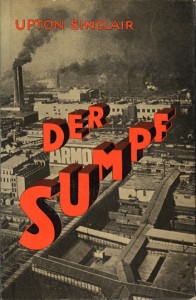
In addition to the over 7,000 linear feet of archival collections made available for study at the University of Houston Special Collections, we are also proud to offer over 100,000 rare and antique books for use in our reading room. Each month we will highlight a text from our collections and what makes it so special.
This week, as we observe Banned Books Week along with the American Library Association and other members of the book community, we shift our formula a bit and focus on works in our collection which have historically been challenged, banned, or otherwise removed from public consumption.

cover of Der Sumpf (or The Jungle) by Upton Sinclair (1926)
BANNED Book of the Month Moment: Der Sumpf (or The Jungle) by Upton Sinclair.
Why So Special Scary? Sinclair’s 1906 muckraking masterwork, depicting the bleak struggle of immigrants in the indifferent meat-grinder of U.S. industrialization, left us more with queasy stomachs than ready to pick up the hue and cry of the downtrodden masses. Having dedicated the work to “The Workingmen of America,” the irony of the book’s lasting impact was not lost on Sinclair who famously quipped, “I aimed for the public’s heart, and by accident I hit it in the stomach.” Sinclair’s political affiliations made the book an easy target for the pseudo-censorship of those fearing the insidious nature of his ideas. (President Theodore Roosevelt, who reportedly called Sinclair a “crackpot,” wrote to the author to advise that after reading a “good deal” of The Jungle he did “not think very much of [Sinclair’s] ecclesiastical correspondent,” that he had come to “distrust men of hysterical temperament,” but “this has nothing to do with the fact that the specific evils… shall, if their existence be proved… be eradicated.”)
Originally published as a serial in Appeal to Reason, major publishers politely passed on the work leaving Sinclair to pay for the first printing himself (see our copy published by “The Jungle Publishing Co., New York” and inscribed “To Rev. Washington Gladden with the compliments of the Author”), before Doubleday, Page & Co. agreed to publish a shorter version in 1906. In light of this particular week, though, our German translation caught my eye not for reasons of tacit disapproval from on high, but a more macabre spectacle that it would involve.
First translated into German in the early 1920s, Der Sumpf may raise some eyebrows from those more well-versed in Deutsch. Literally translated into English as, The Swamp, the peculiarity of the title speaks to the challenges of accurately translating literature across cultures, but perhaps more pointedly calls to mind the muck and mire in which the struggling laborers like Jurgis, young Ona, and their family find themselves. A rose by any other name, however, was certain to burn in the mania of German Nationalsozialismus. Judged contrary to the ideals of Nazism, the works of Ernest Hemingway, Jack London, Jon Dos Passos, and countless others burned on the pyres lit by students and educators in the early 1930s alongside Der Sumpf.
But, the Nazis’ cleansing fires did not burn them all, and we have a copy to prove it.
Location: Our 1926 German edition of Der Sumpf can be viewed and studied in the Special Collections Reading Room during normal research hours. We invite interested parties to visit us and request call number PS3537.I85 J8515 1926 as we look forward to assisting you in your research during Banned Books Week.